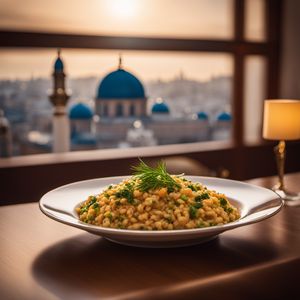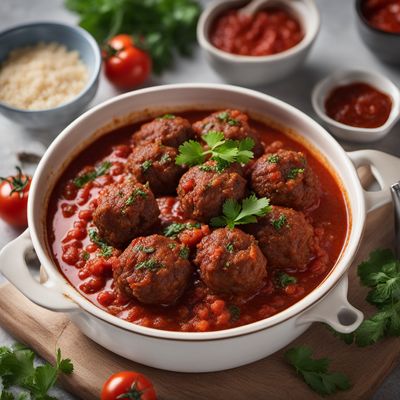
Dish
Dawood basha
Lebanese meatballs
Dawood basha is made by mixing ground beef or lamb with onions, garlic, parsley, and spices. The mixture is then shaped into meatballs and cooked in a tomato-based sauce made with onions, garlic, tomatoes, and spices. The dish is typically served with rice or pita bread and garnished with fresh parsley or mint. The sauce is rich and flavorful, making for a delicious and satisfying meal.
Origins and history
Dawood basha is a traditional Lebanese dish that has been enjoyed for centuries. It is believed to have originated in the city of Tripoli and has since become a popular dish throughout the country. The dish is often served at special occasions such as weddings and religious festivals.
Dietary considerations
Dawood basha is not suitable for vegetarians or vegans as it contains meat. It is also not suitable for those with gluten intolerance as it contains breadcrumbs. However, it can be made with gluten-free breadcrumbs for those with gluten intolerance.
Variations
There are many variations of Dawood basha, with different regions of Lebanon having their own unique take on the dish. Some variations include adding chickpeas or potatoes to the sauce, or using different types of meat such as lamb or veal instead of beef.
Presentation and garnishing
Dawood basha is typically served in a deep bowl with the meatballs and sauce on the bottom and the rice or pita bread on top. It is garnished with fresh parsley or mint and a wedge of lemon. The pickled vegetables are served on the side.
Tips & Tricks
To make the meatballs extra flavorful, add a pinch of cinnamon or allspice to the meat mixture. This will give the meatballs a warm and spicy flavor that pairs well with the tomato-based sauce.
Side-dishes
Dawood basha is typically served with rice or pita bread, as well as a side of pickled vegetables such as cucumbers or turnips. It can also be served with a simple salad of tomatoes, onions, and parsley.
Drink pairings
Dawood basha pairs well with a glass of red wine or a cold beer. It can also be enjoyed with a glass of arak, a traditional Lebanese anise-flavored liquor.
Delicious Dawood basha recipes
More dishes from this category... Browse all »

Abkhazura
Abkhazian cuisine

Akçaabat köftesi
Turkish cuisine

Bakso
Indonesian cuisine

Bakso ayam
Indonesian cuisine

Bakso bakar
Indonesian cuisine

Bakso goreng
Indonesian cuisine

Bakso solo
Indonesian cuisine

Beef Ball
Chinese cuisine
More cuisines from this region...

Iraqi cuisine
Spicy, Flavorful, Aromatic, Bold, Tangy

Israeli cuisine
Savory, Tangy, Spicy, Sweet, Herbaceous

Jordanian cuisine
Spicy, Savory, Herbaceous, Tangy

Mizrahi Jewish cuisine
Spicy, Savory, Herbaceous, Tangy

Palestinian cuisine
Savory, Tangy, Earthy, Herbaceous, Nutty

Syrian cuisine
Savory, Tangy, Earthy, Herbaceous, Nutty

